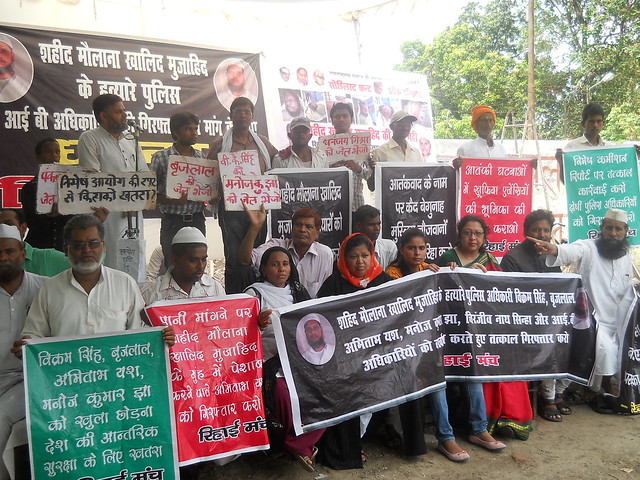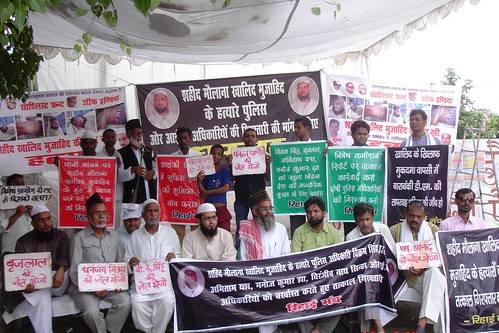By Shamsul Islam
Gujarat Chief Minister and Hindutva icon Narendra Modi, while inaugurating an all-India conference on livestock and dairy development on June 11, 2013 in Gandhinagar, announced a nation-wide campaign to collect small pieces of iron from farmers and use them to build a ‘Statue of Unity’ in memory of Sardar Vallabhbhai Patel, the first interior minister of independent India in Nehru’s cabinet.
He announced, “On the day of Sardar Patel’s birth anniversary on October 31, 2013, we will launch a nation-wide campaign, covering more than five lakh villages throughout the country, to collect small pieces of iron of any tool used by farmers from each village, that will be used in the building of the statue.” This ‘Statue of Unity’ is to be the tallest statue on Earth: the 182 metres (392 feet) tall statue of Sardar Vallabhbhai Patel — the Iron Man — will be built opposite the Sardar Sarovar Dam over the Narmada river in south Gujarat.
![]()
Narendra Modi's love for Sardar Patel is an attempt to rewrite history.
Modi lamented the fact that architect of modern India, “Sardar Patel brought the nation together. But gradually his memories are fading away” and went on to declare that “to reinvigorate his memory and as a fitting tribute to the Iron Man of India, we are building this statue, which will be double in height than the Statue of Liberty in New York.” He also reminded the audience that “Sardar Patel was also a farmer who was instrumental in bringing farmers into the freedom struggle.”
This grandiose project of Gujarat Chief Minister, Narendra Modi, who is an RSS whole-timer, raises a few pertinent issues. He was inaugurating a national conference on livestock and dairying, both of which are passing through a very critical phase due to famine, corporatization of agricultural land and high costs. The well-being of livestock and dairying is essentially connected with the well-being of farmers. According to official data, in the last one decade, on an average, one Indian farmer committed suicide every 40 minutes due to debt, sub-standard seeds/manure, high costs and scarcity of water, to name only few of the endless problems. In the same decade millions of head of cattle have perished due to famine, shrinking pasture lands and handing over fertile lands to business houses and builder mafias. Dairy products have become luxury items beyond the reach of common Indians. India leads the world in having the largest number of under-nourished children and women. Shockingly, Modi had no comments on this worsening scenario.
Modi’s love for Sardar Patel is intriguing for many reasons. Patel was a Congress leader who, inspired by Gandhi’s principle of non-violence, led a great and very powerful movement of farmers at Bardoli taluka in 1928. This is known as the Bardoli Satyagraha and the then pro-British English Press described it as “Bolshevism in Bardoli” and Patel as its “Lenin.”
Patel was awarded the title 'Sardar' after this heroic struggle. This peasants’ movement started against the extortionate lagan imposed by the British rulers and landlords and selling of large tracts of agricultural land to moneybags of Bombay. Sardar Patel led the movement but he had devoted Congressmen/women workers, both Hindus & Muslims, like Imam Saheb Abdul Kadir, Uttamchand Deepchand Shah, Mohanlal Kameshwar Pandya, Bhaktiba Desai, Darbar Gopaldas Desai, Meethubehn Petit, Jugatrambhai Dave, Surajbehn Mehta, Umar Sobani and Phoolchand Kavi, who challenged the colonial masters and their henchmen at the ground level.
One important fact to be noted is that the Hindu Mahasabha and the RSS, which existed during this period, kept aloof from this historical struggle. Modi’s co-option of Patel, who was a prominent Congress leader of the anti-British freedom struggle, is part of a ploy of the Hindutva camp to be seen as part of the freedom movement despite having betrayed it. This kind of co-option game is likely to succeed, as the Congress as a party has become indifferent to its anti-colonial legacy.
Dead persons do not speak, and Sardar Patel cannot appear to put across the truth. However, contemporary documents show that Modi's and the Hindutva camp's love for Sardar Patel is based on lies. Sardar Patel hated Hindutva politics and was the person who imposed the first ban on the RSS. The February 4, 1948 communique issued by the Home Ministry headed by Sardar Patel banning the RSS was self-explanatory:
“In their resolution of February 2, 1948 the Government of India declared their determination to root out the forces of hate and violence that are at work in our country and imperil the freedom of the Nation and darken her fair name. In pursuance of this policy the Government of India have decided to declare unlawful the RSS.”
The communique went on to say that the ban on the RSS was imposed because
“Undesirable and even dangerous activities have been carried on by members of the Sangh. It has been found that in several parts of the country individual members of the RSS have indulged in acts of violence involving arson, robbery, dacoity, and murder and have collected illicit arms and ammunition. They have been found circulating leaflets exhorting people to resort to terrorist methods, to collect firearms, to create disaffection against the government and suborn the police and the military.”
It was Sardar Patel who, as Home Minister, did not hesitate in telling the then supremo of the RSS, Guru Golwalkar, that his organization was responsible for killing Gandhi and instigating violence. In a letter written to Golwalkar, dated 11 September 1948, Sardar Patel stated:
“Organizing the Hindus and helping them is one thing but going in for revenge for its sufferings on innocent and helpless men, women and children is quite another thing… Apart from this, their opposition to the Congress, that too of such virulence, disregarding all considerations of personality, decency or decorum, created a kind of unrest among the people. All their speeches were full of communal poison. It was not necessary to spread poison in order to enthuse the Hindus and organize for their protection. As a final result of the poison, the country had to suffer the sacrifice of the invaluable life of Gandhiji. Even an iota of the sympathy of the Government, or of the people, no more remained for the RSS. In fact opposition grew. Opposition turned more severe, when the RSS men expressed joy and distributed sweets after Gandhiji’s death. Under these conditions it became inevitable for the Government to take action against the RSS… Since then, over six months have elapsed. We had hoped that after this lapse of time, with full and proper consideration the RSS persons would come to the right path. But from the reports that come to me, it is evident that attempts to put fresh life into their same old activities are afoot.”
Sardar Patel continued hammering the fact that the Hindutva brigade collectively was responsible for the murder of Gandhi. In a letter to Nehru dated February 27, 1948, he wrote, “It was a fanatical wing of the Hindu Mahasabha directly under Savarkar that hatched the conspiracy and saw it through. It also appears that conspiracy was limited to some ten men… Of course, his [Gandhiji’s] assassination was welcomed by those of the RSS and Hindu Mahasabha who were strongly opposed to his way of thinking and to his policy.”
Sardar Patel stressed the same fact in his letter to a prominent leader of the Hindu Mahasabha, Shyama Prasad Mookerjee, on July 18, 1948: “As regards the RSS and the Hindu Mahasabha, the case relating to Gandhiji’s murder is sub-judice and I should not like to say anything about the participation of the two organizations, but our reports do confirm that, as a result of the activities of these two bodies, particularly the former, an atmosphere was created in the country in which such a ghastly tragedy became possible. There is no doubt in my mind that the extreme section of the Hindu Mahasabha was involved in the conspiracy. The activities of the RSS constituted a clear threat to the existence of Government and the State. Our reports show that those activities, despite the ban, have not died down. Indeed, as time has marched on, the RSS circles are becoming more defiant and are indulging in their subversive activities in an increasing measure.”
Despite all these facts, Narendra Modi claims to love Sardar Patel. It only shows that Modi has no qualms about resorting to deceits for selfish gains. Sardar Patel is a ready-made heroic figure. Modi does not have to manufacture him. He and the RSS have only to hide the fact that the man was opposed to their organization and had acted against it, and then, by what can only be called theft, proceed to make him one of their own. This defiance of historical fact is characteristic of the strategy of the Hindutva camp. Goebbels is dead, long live Modi.
[I am thankful to Mr. Mukul Dube for inputs]
----
Shamsul Islam teaches political science at University of Delhi. notoinjustice@gmail.com.

























